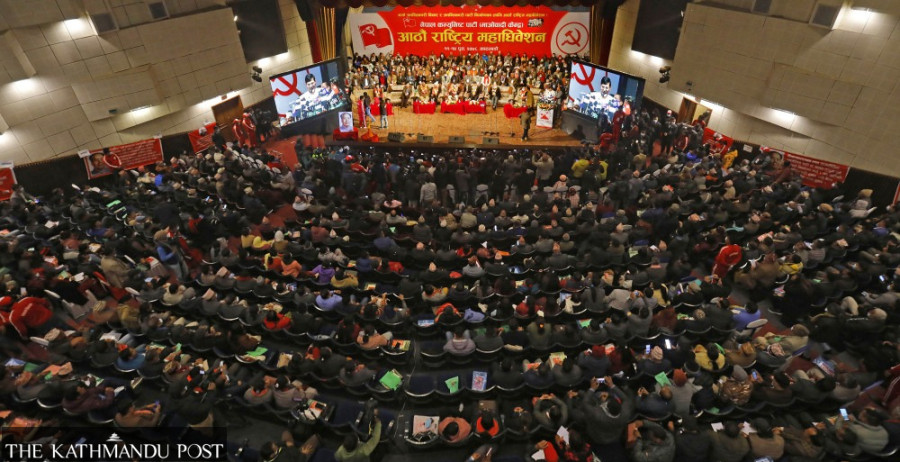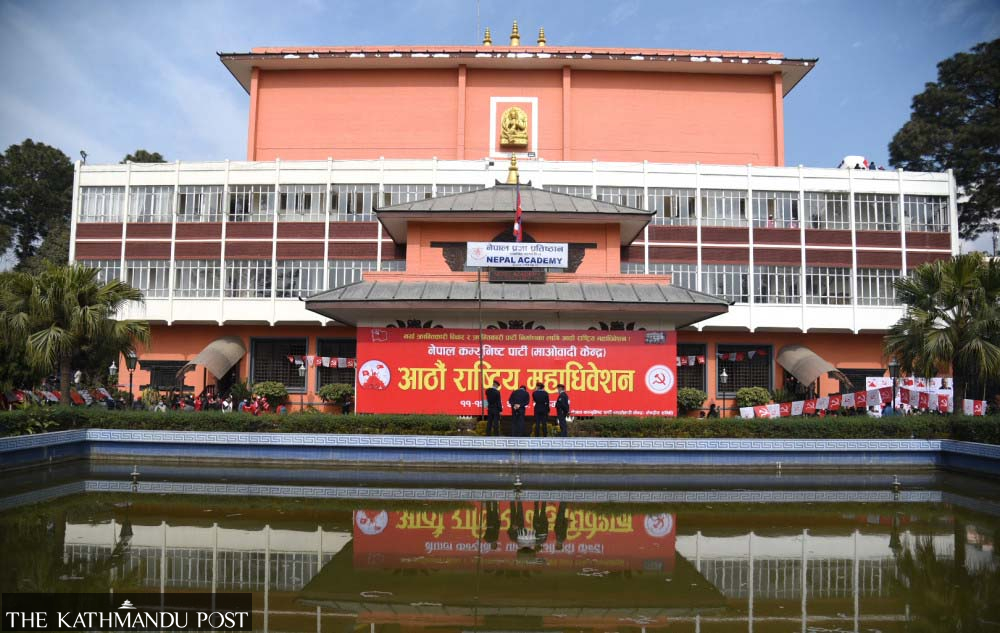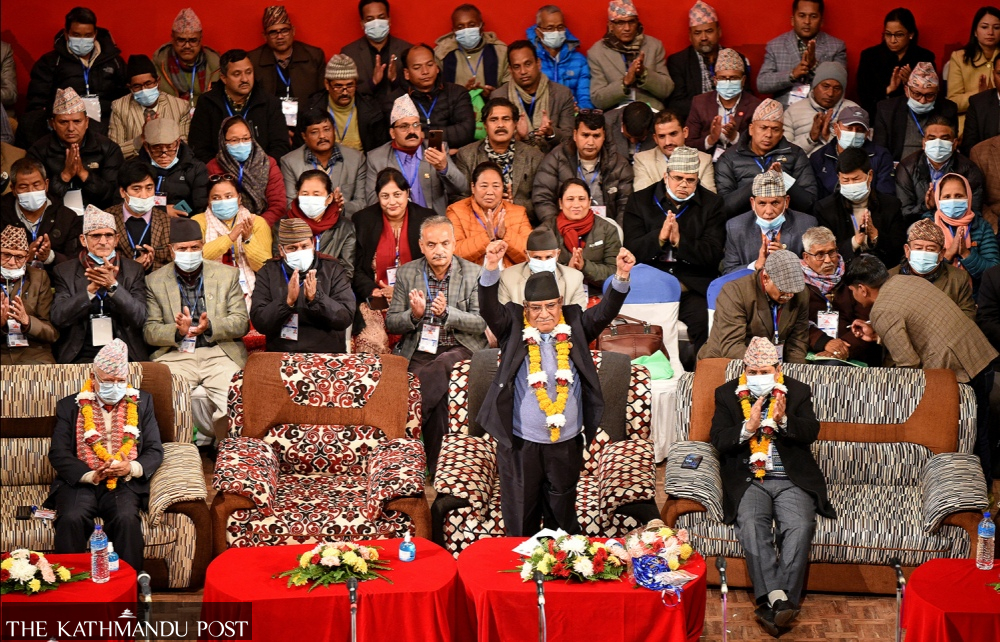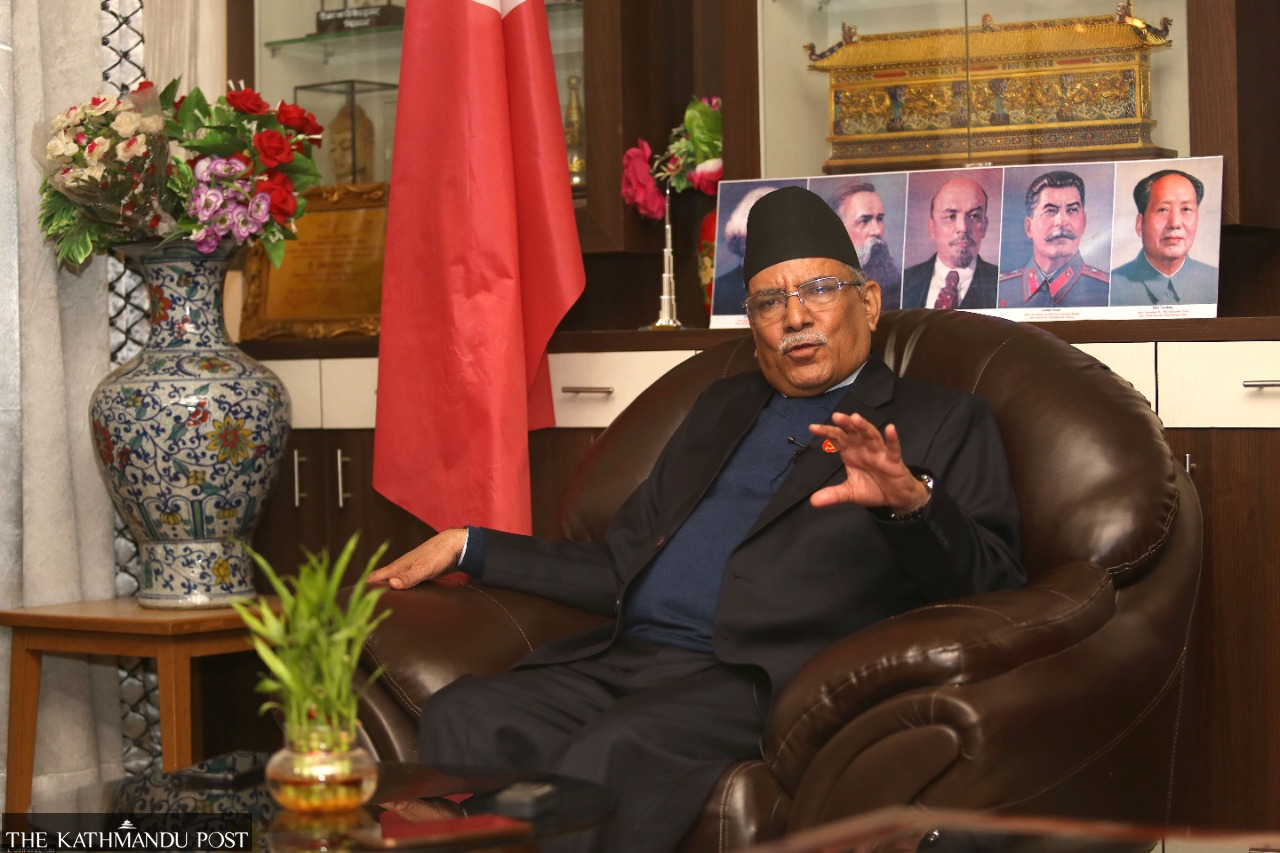Politics
As Maoists hold national convention, focus remains on managing leaders
Ideology takes a back seat as party is forced to propose 15 office bearers to ‘adjust’ aspirants.
Tika R Pradhan
Communist Party of Nepal (Maoist Centre) leaders said before the party’s general convention, initially named “first historic national conference”, that the gathering will largely focus on ideological and political issues and documents—not on leadership.
But as soon as they went into an overnight renamed “eighth national convention”, leadership management took centre stage.
Hours before the inaugural session on Sunday, the last meeting of the Central Committee proposed 15 office bearers, including the party chair.

While Pushpa Kamal Dahal, the uncontested leader for over three decades, is set to be reelected party chair for the next five years, the party has proposed an amendment to the statute to have one senior vice-chair and one general secretary.
The party has proposed two deputy general secretaries, three secretaries and a treasurer.
“A proposal to amend the party statute to have 15 office bearers will be presented at the closed session tomorrow,” Krishna Bahadur Mahara, the party spokesperson, said after the Central Committee meeting on Sunday.
Insiders and delegates say even though the leaders aim to develop a “new revolutionary thought” and build “a revolutionary party” from this convention, they are not quite optimistic, given the start in which leadership management has become a priority.
The new positions have been created to “adjust” leaders, according to them.
“What change can we expect now when our party has not changed a bit in the years since the last convention,” said Lekhnath Neupane, a Central Committee member, who is known for airing critical views in the party. “Without practical implementation of any policy, everything is a farce.”
Neupane is among the few leaders in the Maoist party who question the leadership’s extravagant lifestyles and their conduct.
The Maoist party during its seventh convention held in Hetauda in 2013 had vowed to change leaders’ working styles, lifestyles and conduct and to focus on ideological issues, with the tactical line of launching a “capitalist revolution to lay the foundation for socialism”.
The Hetauda convention was the first to be held since the Maoists laid down their arms in 2006 ending the decade-long “people’s war” to join mainstream politics.
Months later, the Maoists, who had emerged as the largest party in the 2008 elections, lost the polls badly—coming a distant third.
Neupane believes the pledge turned into a farce as leaders did not bother to implement it and the party paid the price in terms of the election loss.
“Even during the seventh national convention, our chair Dahal had vowed to end the lavish lifestyles starting from himself,” said Neupane. “We were supposed to reconnect with the people. But the gap between the people and the party further widened.”
According to Neupane, a Central Committee meeting of the party held in the third week of August had decided to fight “comprador capitalists to attain the goal of scientific socialism”.
“But sadly several party committees are dominated by comprador capitalists,” he said.
Given a long list of aspirants for various posts, it has become apparent why 15 office bearers’ positions have been created.
Since there is no one to challenge Dahal as the party chair, Narayan Kaji Shrestha is likely to become senior vice-chairman.

Shrestha, who parted ways with Dahal in 1994, joined back in 2009, three years after the peace deal.
Dev Gurung, Krishna Bahadur Mahara, Girirajmani Pokhrel, Pampha Bhusal, Haribol Gajurel and Matrika Yadav are likely to become the six vice-chairs.
Gajurel was made treasurer of the party when Mahara was elected general secretary from the national conference held in Biratnagar in May 2014 where Girirajmani Pokhrel, Barshaman Pun and Top Bahadur Rayamajhi were elected secretaries.
Rayamajhi recently deserted the Maoist party to join the CPN-UML in which he was elected a secretary last month.
The two positions of deputy general secretary seem to have been managed for Shakti Basnet and Leelamani Pokhrel.
For the three positions of secretary, there are many aspirants—Devendra Poudel, Hitman Shakya, Rekha Sharma, Urmila Aryal, Shashi Shrestha, Jayapuri Gharti and Onsari Gharti to name a few.
Mahara is most likely to get the general secretary post, for which Janardan Sharma too has been lobbying.
Ganesh Bahadur Gurung, 76, has been associated with the party since 1986, even before it became a Maoist force.
“I have been associated with the party because I strongly believed this was the only force that could build this country,” Gurung from Lalitpur told the Post on Sunday afternoon on the premises of Nepal Academy, the venue for the Maoist Centre’s general convention.
“I have seen my party go through various phases… its ups and downs. But in recent years, leaders have prioritised their individual interests. No one thinks about the party, society and the country,” said Gurung. “Leaders have become self-centred, selfish and power hungry.”
What political line the party takes from this convention will be clear once Dahal presents his document and the convention endorses it.
In an interview with Kantipur, the Post’s sister paper, Dahal admits that the party could not pursue ideological issues the way it should have.

“I have begun an assessment starting from myself why our party also became like any other party that ran behind position and interests… why our party got disconnected with the people,” Dahal told the paper.
On Sunday, while addressing the inaugural session, Dahal reiterated that there was a need for introspection.
“We need to assess ourselves and find out where we faulted,” said Dahal. “We must self-criticise ourselves and it should start from me.”
Nil Prasad Pant was a party member until last year and worked in various committees alongside senior leader Dinanath Sharma.
Pant, currently a lecturer of history at Tribhuvan University, said he has lost hope that the Maoist party would improve now.
“This party is also focused on small and token reforms, like any other capitalist party,” Pant told the Post. “The kin of those killed during the war have yet to get justice. The party has remained indifferent to their plight.”
The Comprehensive Peace Agreement signed in 2006 that ended the “people’s war” explicitly envisioned transitional justice mechanisms.
The Maoist Centre, or its chair Dahal for that matter, has not been committed to ending transitional justice even 15 years after the end of the war.
Puran KC, a delegate from Palpa, said the party must have focused more on ideological issues than leadership management.
“But synthesising an ideology is not possible with a few days of discussions. I think the party needs to hold a conference within a year to devise an ideology,” KC, 33, told the Post.
According to KC, Dahal has been harping on transformation for years but unless the pledge to transform is put into action, the party cannot sustain.
“I hope this convention becomes a platform to launch renewed discussions on transforming the party with a renewed commitment,” he said.
Neupane, the Central Committee member, agrees.
“Unless we practise what we preach, change is not possible,” he said. “I’m not hopeful of any drastic change from this convention. We need to be committed to what we say and focus on core issues, not on formalities, rituals and fanfare.”




 8.79°C Kathmandu
8.79°C Kathmandu














